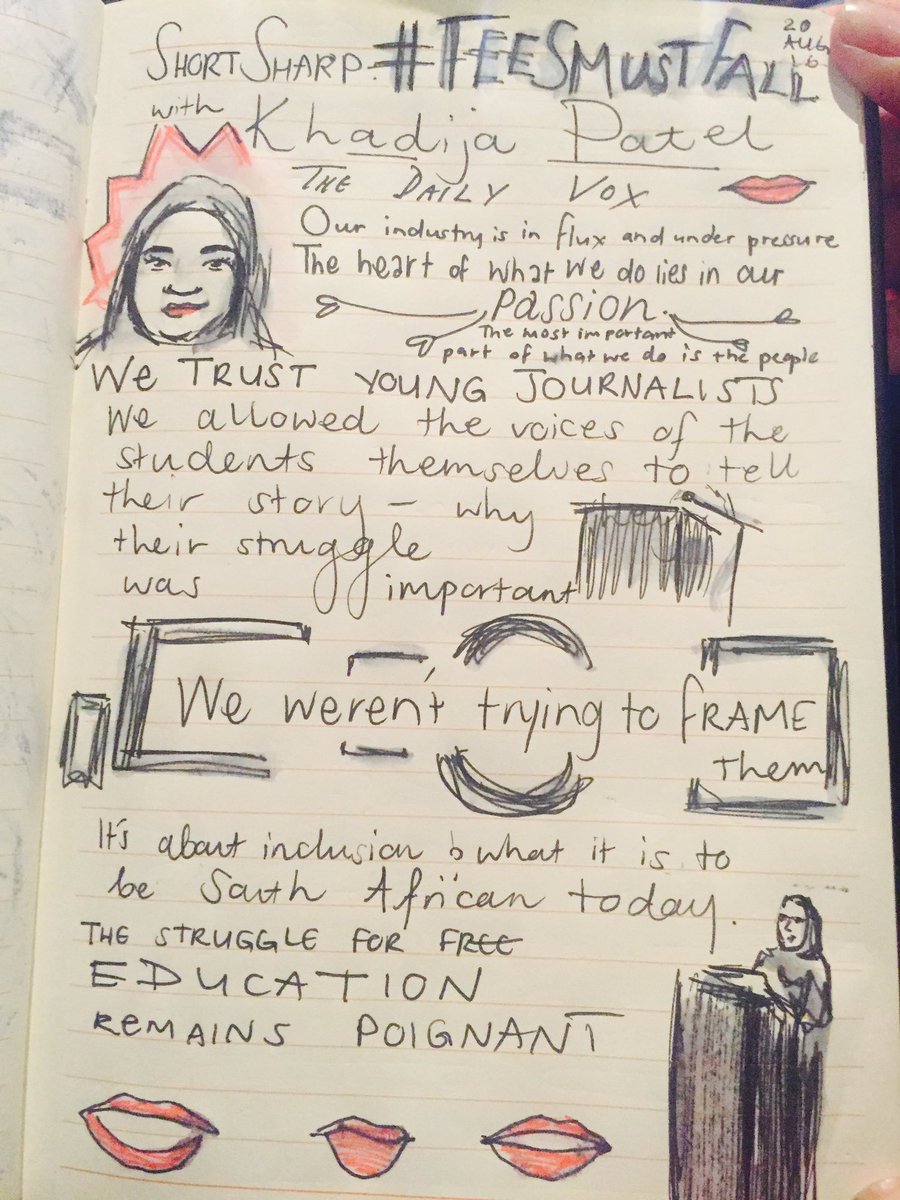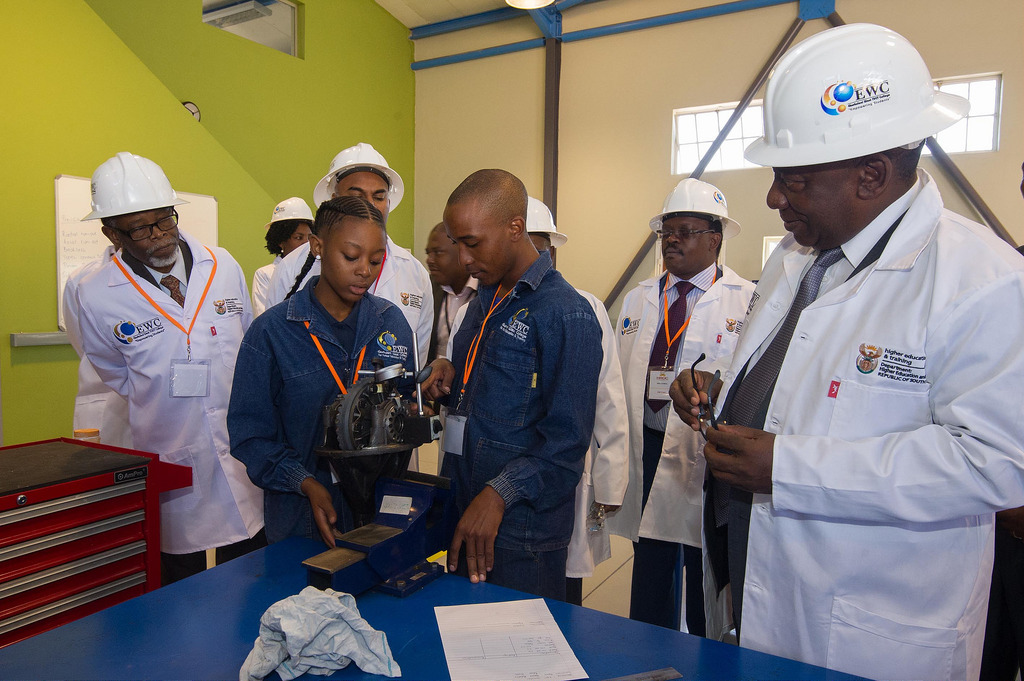On the second day of the 2016 Menell Media Exchange The Daily Vox executive editor Khadija Patel gave a presentation on what it was like to cover #FeesMustFall back in October 2015. Below are her speaking notes.
I want to begin by acknowledging the praise The Daily Vox received here, at this conference. Journalism is not easy at any time. But when you’re a tiny start-up, in a tough economy, the work we do is especially hard. So, hearing that our work is appreciated, but moreover, has made an impact, means a great deal – and not just to me, but to all the people who have helped us tug our small machine along.
So I want to begin with a word of thanks to everyone who has supported us, whether by contributing to our crowd funding campaigns, or reading our work.
Make no mistake, The Daily Vox is a team effort.
I did not begin The Daily Vox alone.
The publication was established in 2014 by Azad Essa and I, with the intention to develop young journalists.
I cannot offer any definitive recipe to replicate what we did with Fees Must Fall last year. But I can begin by pointing to the people behind it. They are young, they are passionate, and they are invested in the idea of a more equitable world.
But how did we happen across this team?

About four years ago, I was a minion reporter elsewhere, and The Daily Vox was not even an idea, more a tangle of thought and aspiration that I believed would come to fruition somewhere in the distant future. But I was also at a particular moment in my own career, a moment that may be familiar to many young journalists.
I was frustrated with the South African news media. I felt quashed by what felt, at that time, as the hegemonic, white, middle-class voice dictating what is news, and how it is packaged as news. I was jaded and disillusioned. I was surly and discontent. And if I was so inclined, I think this would be the time I would have been driven to drink.
And I was not alone in these feelings.
I had watched other colleagues retreat further and further into the shadows, after growing disillusioned by the roles they were sometimes expected to fill in the newsroom.
And I believed that the only way we could counter this effectively was through the emergence of a new generation of journalists who are not intimidated by the establishment.
It was at around this time that I was invited to address a Wits Media Studies class.
So when I went into that media studies class, I delivered an impassioned plea to the students to be unafraid to challenge the existing structures, to force transformation by the stubbornness of their own convictions.
I certainly felt a lot better getting all that off my chest. And I thought I had done a decent enough job firing up a group of young people to go out and do what they do best, change the world.
Except, as the floor opened for questions, one young woman raised her hand, and acknowledged everything I had said, but, she asked why I was waiting for the younger people to come on board to change the things I knew needed to be changed.
“What are you doing right now?” she asked.
And that interaction stayed with me for some time after.
Fast forward to Wednesday 14 October 2015.
It was that same young woman who began tweeting videos and updates from Wits University, as a group of student protesters blockaded the entrances to the Braamfontein campus. That young woman, is someone you all heard here, this morning, Pontsho Pilane. But she was not the only student from that class who would join our team. Aaisha Dadi Patel, was also in that media studies class. And she’s now a senior member of our team.
It’s important to trust young reporters with BIG stories @khadijapatel .Monk Nkomo trusted as an intern.#dukemmx16 pic.twitter.com/2UuwkiJdat
— Themba Sepotokele (@sepotokelet) August 20, 2016
And between Aaisha and Pontsho, we had Wits covered.
We were there before it became a traffic update on the big radio stations.
But it was no trick that we were there at Wits.
Sure, Aaisha and Pontsho were both students at Wits.
But we had been covering student movements for months already.
Pontsho had been hosting weekly Google Hangouts with representatives from student movements across the country. Aaisha routinely did vox pops from the campus on major news events.
The Hangouts were not being watched by thousands of people. But we did it because we felt it was something that needed to be recorded as well as tracked, and it assisted us in establishing networks with the students.
Many news organisations handle breaking news poorly or developing news stories poorly because often they haven’t been tracking the story and they don’t know where the story has come from. So they have no contacts, they have no idea of what the people want, they have no idea of the background of the story. We didn’t have that problem. We were far ahead.
We could tell that something was brewing. We just couldn’t tell that would play out in the way that did it. But most importantly it was crucial for us to trust our journalists.
They would tell us things that pushed against the established narrative – for instance when the car at Wits was turned over and everyone else was saying it was a “mob of students getting violent”. Our reporter told us that the car had tried to run over someone and therefore students responded. We trusted our journalists and the audience trusted us a result.
But in addition to having young people like Pontsho and Aaisha, Zilungile Mnisi and Lizeka Maduna in Durban, student journalists from the Oppidian Press in Grahamstown, and Ra’eesa Pather in Cape Town, all captained by Faranaaz Parker and Benazir Cassim here in Joburg, with Sayneds Hassen on social media, we sought to allow the voices of the students themselves tell the story. We did not seek to impose a narrative on them. We let their voices tell the story.
I firmly believe that we need journalists to be out in the streets – and not just Braamfontein, or Rosebank – speaking to people, unpacking the complexities of who we are. It is this philosophy that drove our success during Fees Must Fall. But we were also not afraid to lay our own editorial bias in an editorial. This was also crucial.
And it was up to me, to remind our team, that while we may sympathise with the protesters, our job was still to tell the story accurately.
And we stayed with the students, broadcasting their views, when the bigger organisations were only waiting for the VC to speak.
As Pontsho herself said this morning, we know we could have done better. But we also know that we were able to show the possibility of the media in what it should be, an instrument of the people in holding power to account.
And it is in the spirit of what we did during Fees Must Fall, that we hope to establish South Africa’s first publicly funded mobile journalism fellowship.
For me, this was keynote of #dukemmx16 simply because .@khadijapatel & .@thedailyvox are non-conformists of note ✊🾠https://t.co/I4H4T309Mo
— Lorato (@LoratoTshenkeng) August 20, 2016
Featured image by Ashraf Hendricks
Editor’s note: This post was updated to reflect the contributions from students at the University currently known as Rhodes to our #FeesMustFall coverage, as well as the contributions of our sub-editor. No malice was intended in the exclusions in the original text.

![UCT-Protest-Parliament-7 [slider]](https://www.thedailyvox.co.za/wp-content/uploads/2015/11/UCT-Protest-Parliament-7-slider.jpg)







